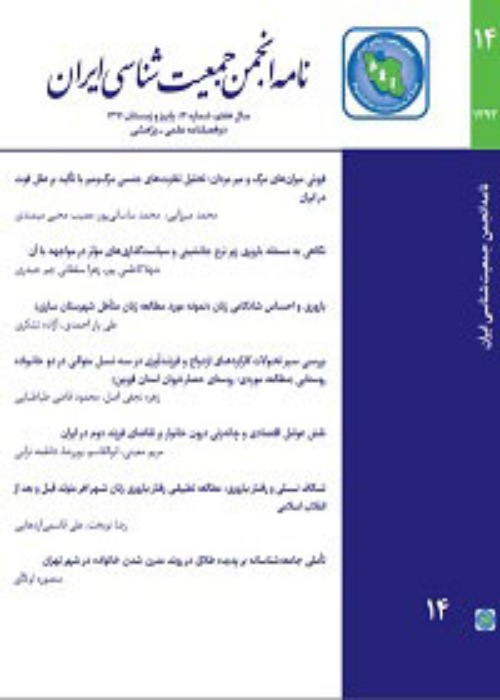Tendency toward Remarriage among Elderly Widows in FereydoonShahr District, Iran
This research was conducted with the aim of investigating the desire to remarry elderly widows of Feridunshahr city, using an analytical-cross-sectional survey method. The statistical population of all elderly widows of this city is 1254 people and the sample size is estimated to be 264 people with the help of Morgan's table. A researcher-made questionnaire was used to collect data using the quota sampling method. The evaluation of the hypotheses showed that there is a significant correlation between the variables of mental problems, sexual problems, attachment to children, network support and normative inhibitors with the dependent variable. The variables of appearance problems and physical problems among the whole sample are correlated with the dependent variable It was significant that this result was not achieved by gender segregation. Also, the Tendency to remarry was different according to the job variables and the level of literacy of the respondents. The regression analysis shows that the variables of appearance, mental, sexual problems, network support and normative inhibitors have explained more than 55% of the changes in the dependent variable, according to which the research model has good explanatory and predictive power. In general, it can be concluded that the desire to remarry among the elderly men of this city is more than the women and the issue of remarriage of the elderly should be placed as a priority of the responsible institutions and organizations.
One of the issues and problems of Feridounshahr, a city located in the Isfahan province of Iran, is the considerable number of elderly widows. This situation engenders multiple adverse outcomes, such as reduced self-efficacy, pervasive feelings of hopelessness, and decreased mental well-being. Therefore, conducting a thorough investigation into the factors impeding the remarriage of the elderly is an important research priority, motivated present paper to examine the desire to remarry among elderly widows in Feridunshahr city and the factors that influencing it.
Methods and data:
The statistical population included all 1254 elderly widows in Feridounshahr, with a sample size of 264 determined using Morgan's table. Data was collected through a researcher-designed questionnaire, distributed via proportional sampling. The validity of the questionnaires was assessed through form and content evaluations by experts, and reliability was established using the Cronbach's alpha test.
The data analysis suggests that as women age, their interest in remarriage decreases. Furthermore, the longer women remain widowed, the less inclined they are to remarry, a pattern that is not evident among male counterparts. Additionally, an increase in concerns about appearance correlates with a reduced desire to remarry, a finding that does not differ when considering gender separately; thus, gender does not significantly impact this outcome. The findings of the study indicate that increasing sexual and mental health challenges significantly lessen the remarriage interest among respondents. Similarly, an increase in physical health issues also leads to a decline in remarriage interest among the elderly, with no significant difference between genders. The data indicates that increased social interaction difficulties are associated with a decreased likelihood of remarriage, though this was not statistically significant for the men studied. It's noteworthy that a women's loyalty to their previous spouse inversely affects their remarriage interest, a pattern that is not evident in men or the general population studied. The research also shows that increased dependency on children diminishes the likelihood of remarriage for both men and women. Contrarily, women's financial capabilities and assets did not show a significant connection with the desire to remarry, thus not supporting the related hypotheses. However, social network support exhibits a significant relationship with remarriage desire, showing that changes in network support levels correspond with shifts in remarriage interest. Similarly, changes in normative inhibitions directly affect the desire to remarry. It is also highlighted that the remarriage tendency varies according to job roles and literacy levels of the individuals. Regression analysis further demonstrates that appearance, mental, sexual issues, network support, and normative barriers account for over 55% of the variance in the dependent variable, suggesting the research model's strong explanatory and predictive capabilities.
The rise in life expectancy and changes in the age pyramid's structure have led to an increase in both the elderly population and the duration of old age. This trend shows the need for focused attention and policy development to address the needs of the elderly. Among the most critical needs for this group is the enhancement of mental health, alleviation of loneliness, and prevention of depression. Furthermore, marriage serves as an effective means to quality of life indicators—encompassing physical, mental, health, and social aspects—among the elderly. However, this has been hindered by a multitude of cultural, customary barriers, and entrenched societal norms. It is imperative that this matter receives prioritized consideration from the relevant institutions and organizations.
- حق عضویت دریافتی صرف حمایت از نشریات عضو و نگهداری، تکمیل و توسعه مگیران میشود.
- پرداخت حق اشتراک و دانلود مقالات اجازه بازنشر آن در سایر رسانههای چاپی و دیجیتال را به کاربر نمیدهد.


